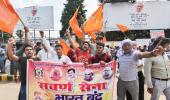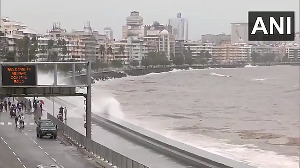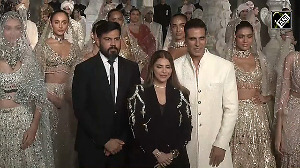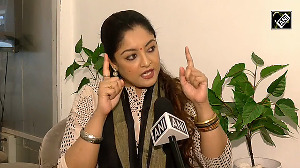Caste assertions, including from the upper castes, could have the Sangh Parivar stumble yet again in its efforts to construct a Hindu rashtra, reports Archis Mohan.

Politics in north India is in ferment like it has seldom been since the monsoon of 1990.
That year had marked the beginning of a caste assertion which halted the Sangh Parivar juggernaut of the early 1990s.
The V P Singh government had virtually resurrected B R Ambedkar by conferring upon him the Bharat Ratna, announced that it would implement the Mandal Commission recommendations and also brought a stringent law to prevent atrocities on the Scheduled Castes and Scheduled Tribes.
In its aftermath, the Dalit and OBC (Other Backward Classes) leaderships frustrated the Sangh Parivar project of harnessing a consolidated Hindu vote for its political arm, the Bharatiya Janata Party.
Twenty-eight monsoons later, and just when it looked that the BJP is on the cusp of harnessing a consolidated Hindu vote for a second Lok Sabha election in succession because of its outreach to the Dalits and the OBCs, caste assertions, including from the upper castes, could have the Sangh Parivar stumble yet again in its efforts to construct a Hindu rashtra.
On September 6, upper caste outfits across northern Indian states gave a call for a strike -- a Bharat Bandh.
Incidents of violence were reported from some areas and BJP leaders heckled in poll-bound Madhya Pradesh.
But for the outfits leading the protest -- the likes of the Brahma Samaj, the Parashuram Sena, the Savarna Jana Kalyan Sangathan, the Kshatriya Sena -- the response to their Bharat Bandh call was largely ambivalent.
Its severest impact was witnessed in some districts of Madhya Pradesh, particularly in Gwalior and in Bihar's Muzaffarpur where some activists beat up Lok Sabha member Pappu Yadav.
These outfits were protesting the Narendra Modi government ensuring the passage of a bill in the monsoon session of Parliament that restored the more stringent penal provisions of the Scheduled Castes and Tribes (Prevention of Atrocities) Act.
The amendments overturned the Supreme Court order of March 20 that had diluted these provisions.
Under pressure after a massive Dalit protest on April 2, and from the Opposition as well as its allies, the Modi government had brought in the amendments, upsetting members of the upper castes in much of northern India.
Belying the expectations of the upper caste outfits, the OBCs didn't come out in large numbers to support the strike call.
Within the Sangh Parivar, as well as the BJP, this state of play with barely nine months to go for the Lok Sabha election has alarm bells ringing.
There are fears of a repeat of 1993, when the OBCs, led by Mulayam Singh Yadav, and the Dalits, led by Kanshi Ram, had come together for the Uttar Pradesh assembly polls to stop the BJP's electoral rath in the wake of the demolition of the Babri mosque in Ayodhya.
That alliance had proved to be short-lived, but accomplished its purpose of preventing the BJP from forming a government in the state.
A putative Akhilesh Yadav-led Samajwadi Party and Mayawati's Bahujan Samaj Party alliance for the Lok Sabha in Uttar Pradesh could prove to be equally disastrous for the BJP.
However, the Sangh Parivar is also worried that its Dalit outreach has upset the upper castes enough to not turn up for voting, or press 'NOTA' as a mark of protest.
The Sangh Parivar assessment is that the BJP lost the Phulpur and Gorakhpur Lok Sabha by-polls primarily because its upper caste voters didn't turn up.
Since the last few days, several BJP leaders have tried to reach out to the upper castes, as also the Dalits.
If Lok Sabha Speaker Sumitra Mahajan advised the upper castes to be patient, the BJP in a symbolic gesture to mollify the Dalits decided upon the Ambedkar International Centre as the venue for its national executive meeting.
In their speeches, Prime Minister Narendra Damodardas Modi and BJP President Amit Anilchandra Shah stressed on the work the BJP government at the Centre has done in the last four years to accord respect to Ambedkar.
In the meantime, the Congress has tried to reclaim its Brahmin support base of the 1980s, with Haryana leader Randeep Singh Surjewala holding a Brahmin conference in his state, while senior Madhya Pradesh leader Kamal Nath raising issues that are close to the hearts of Brahmins, including cow protection.
Political observers in Madhya Pradesh, Uttar Pradesh and within mainstream political parties believe the Congress would find little success in its efforts, but the BJP has definitely fallen in a political trap laid out for it by the Congress and would need a Houdini's act to escape unscathed in the 2019 polls.
"It is clearly less about Dalit rights and more a political fight in the run-up to the assembly polls in Madhya Pradesh, Rajasthan and Chhattisgarh, and the subsequent Lok Sabha elections," says Anand Vardhan Singh, a Lucknow based political analyst.
"The scheduled castes form a sizeable vote bank in north India. It could hurt the BJP if it is perceived as primarily an upper caste party. On the other hand, the party is facing the risk of upsetting the upper castes," Singh says.
An ace up the BJP's sleeve is implementing what is called the Karpoori Thakur formula of providing for quota for the extremely backward castes within the 27 per cent reservation for the OBCs.
Bihar Chief Minister Nitish Kumar had implemented it in Bihar to counter Lalu Prasad-led Rashtriya Janata Dal's sway over the OBCs.
"It is a bit too late for such strategies. The BJP has exposed itself to be an upper caste party among not just the Dalits, but also OBCs. Why else do you think that large sections of the OBCs didn't participate?" asks All India Ambedkar Mahasabha chief Ashok Bharti, a key leader of the April 2 strike.
At present, these caste contradictions in north India, as also Maharashtra, have become an additional headache for the BJP along with increasing anger over increasing petrol and diesel prices, the impact of demonetisation and goods and services tax on small businesses, and the agrarian distress.
It will be interesting to watch whether the BJP, under Modi and Shah, can convince the Dalits and the OBCs to unite with the upper castes against the 'common enemy' of 'breaking India brigade', as the party puts it, of the so-called 'urban Naxals'.












